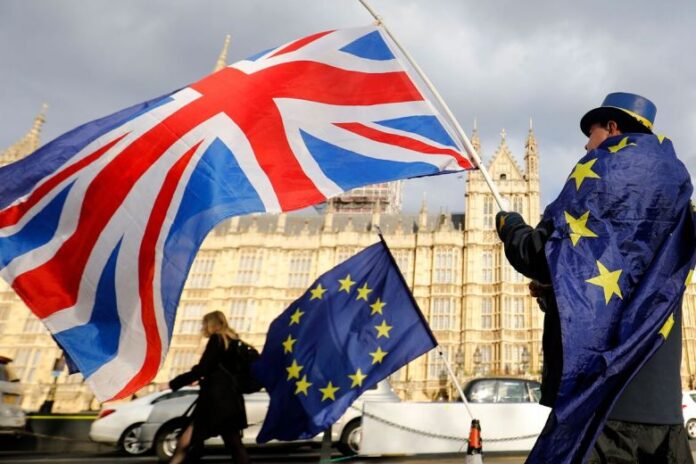BRUSSELS: British and EU trade negotiators have failed to close the gap on state aid, a key element barring their new agreement on post-Brexit trade ties, officials and diplomatic sources with the bloc said as 27 national leaders gather in Brussels on Thursday.
The two-day summit in Brussels is due to deal with foreign policy but chairman Charles Michel and the bloc’s executive will also on Friday give their latest assessment on Brexit.
Disagreements over corporate subsidies, fisheries and ways to solve disputes have overshadowed trade talks, while a proposed UK law that would undermine its earlier divorce deal with the bloc triggered a new crisis last month.
Britain’s lower house of parliament approved the Internal Market Bill on Tuesday and it is now with the House of Lords. The United Kingdom says ensuring that its nations can trade freely with each other after Brexit would require breaking the divorce deal provisions on the sensitive Irish border.
The executive European Commission, which negotiates with Britain on behalf of all the bloc’s members, wants London to agree to broad state aid rules that would be compatible with those the EU has.
The bloc wants an independent British regulator to decide on state aid there, as well as a new EU-UK dispute settling mechanism that would create a new Joint Committee and an Arbitration Panel to adjudicate.
Should one side fail to honour decisions made through that process, the Arbitration Panel could impose fines and the other side could retaliate by hitting bilateral trade elsewhere.
“The problem is that the UK doesn’t want to follow that path,” an EU diplomat following Brexit told Reuters.
An EU official, who is involved in the talks, echoed that: “It remains to be seen if the UK can sign up to that … We haven’t got there yet. Not sure we’ll ever get there.”
Britain wants control of its subsidy regime and says that state aid clauses are not usually put in free trade agreements.
Sterling weakened by around 0.3% against both the euro and the dollar immediately after the report, and stood at $1.2880 at 0747 GMT, down from $1.2930 beforehand.
“WITHDRAW INTERNAL MARKET BILL”
With time available until the end of the year running out, pressure is growing on the EU and Britain to put a deal in place to avoid putting an estimated trillion euros of annual trade at risk.
This week’s ninth negotiating round – due to finish early on Friday – is the last scheduled so far and EU leaders will again assess progress on Oct.15-16.
They could switch to contingency planning for the most damaging economic split without new arrangements or, should trade talks cover enough ground, authorise final make-or-break negotiations known as the “tunnel” until the end of the month.
The EU says a deal must be at hand by early November to give the European Parliament and some national parliaments enough time to ratify it before Britain’s standstill post-Brexit transition expires at the end of the year.
A senior EU diplomat said the bloc has become more hopeful over the last fortnight that Prime Minister Boris Johnson – the main face of the Brexit campaign that took Britain out of the bloc this year – was looking for a deal despite the new legal controversy that increased risk of a ‘no-deal’ exit.
“Signals are being sent that suggest a more hopeful scenario, and certainly the UK government has been signalling a very strong interest in entering the tunnel,” the diplomat said. “We remain hopeful that a deal will be concluded.”
But EU sources were also adamant that the bloc would not implement any new UK deal as long as London undermines the divorce treaty.
“The internal Market Bill would have to be withdrawn,” said the senior EU diplomat.
























